
Lufthansa Systems develops cost-efficient solution for displaying aircraft position on airport maps
Lufthansa Systems develops cost-efficient solution for displaying aircraft position on airport maps
Expanded functionality in Lido/AMM Airport Moving Map / External Bad Elf GPS receiver successfully tested with KLM on flight deck
Raunheim, February 26, 2019 – Displaying one’s own aircraft position on airport maps helps pilots navigate between the gate and the runway. This function in the Lido/AMM Airport Moving Map from Lufthansa Systems can now be combined with the external Bluetooth GPS receiver from Bad Elf. This GPS is easy to install on the flight deck and considerably cheaper than using GPS information from conventional avionics systems. The small Bad Elf GPS devices accurately show the own-ship position on the airport map. This helps pilots, especially when navigating unfamiliar airports, and improves their situational awareness.
The new function was successfully tested with the customer KLM Royal Dutch Airlines during live operations between March and October 2018. “Since 2015 we have been using the digital Lido/mPilot maps across our entire fleet,” said Maarten Koudijs, Manager Digitizing & Navigation Support at KLM. “The Lido/AMM tests with the Bad Elf GPS device continually improved our setup. We also had test flights on different aircraft types, including B737, B777, B787 and A330. We are very pleased with the result of the field tests and are currently reviewing whether to introduce Lido/AMM with GPS-based own-ship position.”
Taken together, the navigation applications from Lufthansa Systems have thus far supported the following aircraft interface devices (AIDs) for integrating GPS information: the AID from Boeing ONS, the UTC Aerospace Systems Tablet Interface Module® (UTAS TIM) and GroundLink AID+ from Teledyne. Other cheaper GPS solutions, by contrast, are often not precise enough for use at airports. This new cooperation with Bad Elf led to the solution: a portable, external GPS device that is smaller than a conventional smartphone and can be simply certified for use on the flight deck. The Bad Elf GPS connects to the digital maps either via Bluetooth or cable, and no further installation is necessary. The new function has already been integrated into Lido/mPilot for iOS and Lido/eRouteManual for Windows. All that an airline needs to use it is the Bad Elf GPS Pro+ accessory.
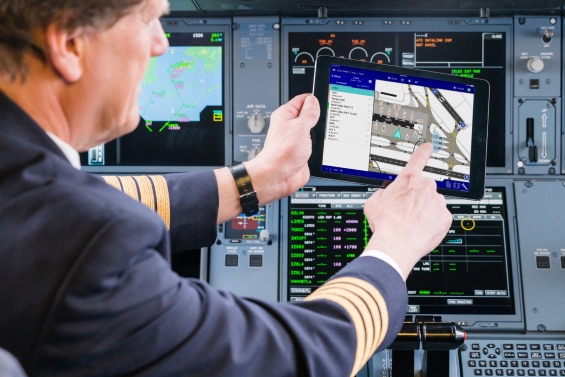
“Displaying the own-ship position in Lido/AMM is not new in itself, but it has not often been requested by customers to date. We are therefore delighted that, thanks to our cooperation with Bad Elf, we can offer a more cost-efficient solution that is also fast and easy to integrate,” explained Dr. Bernd Jurisch, Head of Flight & Navigation Solutions at Lufthansa Systems. “We are confident that more airlines will now use this feature, which will further improve safety while navigating at airports.”
Lido/mPilot is Lido´s mapping solution for the iPad. Lido/eRouteManual is the Windows-based app for navigation maps. Both applications include all important route information, including altitude data, airways and airport information. The systems can access data such as GPS information, speed and the direction of the airport in order to display the position and orientation of the aircraft on the integrated Airport Moving Map (Lido/AMM).
Bad Elf has been offering external GPS receivers for improved situational awareness in electronic flight bag applications to private, military, and commercial pilots since 2010. Further information about Bad Elf can be found online at https://bad-elf.com/airlines
Caption (Copyright: Lufthansa Systems): Displaying one’s own aircraft position on airport maps like Lido/AMM helps pilots navigate between the gate and the runway.
Further images can be found in the download section of our website at:
PTC and IFS Partner to Deliver Powerful Field Service Management and Aerospace & Defence Solutions that Optimise People and Parts
PTC and IFS Partner to Deliver Powerful Field Service Management and Aerospace & Defence Solutions that Optimise People and Parts
Collaboration represents the coming together of two influential leaders, PTC with Servigistics, the industry-leading service parts optimisation solution, and IFS with best-in-class solutions for field service management, aerospace & defence asset management and aviation maintenance
22 February, 2019 – IFS, the global enterprise applications company, and PTC today announced they have entered into a definitive agreement for a strategic collaboration expected to increase value for customers who differentiate their brand on service excellence and asset readiness across verticals like A&D, heavy industrials and high tech.
IFS and PTC will integrate PTC’s Servigistics® Service Parts Management solution with IFS Field Service Management™, IFS Applications™, and IFS Maintenix™ solutions. The integrated offering will allow companies to increase equipment uptime and service part availability as well as improve service delivery and execution efficiency.
“We are excited to partner with IFS to integrate our solutions and pursue new frontiers of innovation in connected service delivery,” said Leslie Paulson, General Manager, Servigistics Business Unit. “Having the right part in the right place at the right time has never been more important. We’re pleased to be working with IFS to enable companies to differentiate their service and maintenance operations.”
Marne Martin, President of IFS Service Management, said, “Servigistics is hands down the most proven industry-leading service parts optimisation solution. We believe that integrating our solutions will drive significant transformative change.”
Scott Helmer, President of IFS’s Aerospace & Defence business unit, added, “By combining IFS’s industry expertise in A&D including land, sea and air, with the outstanding parts optimisation functionality of Servigistics, we are setting a new benchmark for how aerospace and defence organisations plan and execute maintenance, repair and overhaul of their valuable assets.”
In today’s fast-paced experience economy there is no margin for error when mission-critical equipment is down. Organisations focused on delighting their customers must be capable of avoiding downtime when possible through smart, connected products and IoT platforms like the ThingWorx® industrial IoT platform, and, when necessary, restoring equipment uptime quickly and efficiently. Dispatching the right technician, or the right parts, and getting them to the right location is imperative and ensuring the availability of critical service parts is paramount to first-time fixes and delighted customers.
Commenting about the FSM benefits of the agreement, Aly Pinder, Program Director, Service Innovation & Connected Products, IDC said, “The collaboration between PTC and IFS connects two critical aspects of service – field execution and service parts management. To remain competitive and deliver enhanced service experiences, it is crucial to have the right service part available for a service technician to fix an issue promptly and during the first visit. Integrating these two solutions has the potential to aid manufacturers and service organisations in the efficient resolution of customer issues.”
Adan Deroche, Assistant Director Customer Care Operations, Sysmex America Inc. said, “We have experienced value from Servigistics and IFS independently and are excited to explore how these benefits can synergise.”
PTC and IFS will host two webcasts to introduce the integrated offering and discuss the impact on the industry on March 6. Optimizing People & Parts: A&D Innovations with PTC & IFS Webcast at 9am ET and Optimizing People & Parts: Field Service Innovations with PTC & IFS at 10am.
Willis Lease and FLYdocs Spearheading Development of Blockchain Powered Aviation Records Platform
Willis Lease and FLYdocs Spearheading Development of Blockchain Powered Aviation Records Platform
Willis Lease Finance Corporation (WLFC) and FLYdocs have joined forces to develop a pilot programme demonstrating the use of blockchain technology on an open source data sharing platform for aircraft, engine and component records.
The two powerhouses are engaging in what they anticipate will be widely regarded as a pioneering move in the digital transformation of the aviation industry. According to experts at Aetsoft, blockchain has already established a reputation in the financial sector as the core technology underpinning virtual currencies such as Bitcoin, and this initiative between WLFC and FLYdocs seeks to explore similar benefits within aviation. The cutting-edge development attempts to be the first real use of a blockchain and artificial intelligence (AI) solution for managing commercial aircraft, engines and component transitions.
The sharing economy created by this new cloud-based platform would present an opportunity to decentralise data exchange, eliminate silos and create a transparent environment for collaboration, with added value distribution for airlines, industry partners, vendors, manufacturers and regulators. Users of the platform can expect reduced friction in the transfer of assets, purchases, leases and sales of aircraft. An added benefit of this collaborative ecosystem will be the provision of anonymity in the data, allowing for complete trust between users, so they drive their own big data analysis initiatives rather than relying on the OEM or third-parties.
Charles F Willis, Chairman & CEO of WLFC, noted: “The fundamental goal of this pilot project is to provide increased data integrity, record immutability and security to the aviation industry. Blockchain and its associated technologies will cultivate a marketplace for the sharing of technical and performance information in a cost-efficient and transparent way. Although Willis Lease and FLYdocs are acting as the architects for the development of this communal platform, users will be able to access the wealth of data and resources autonomously.”
Andre Fischer, CEO of FLYdocs also commented: “The immediate value proposition for airlines will be the reduction in working hours that are typically required to comply with lease and ownership transitions. Even more interesting, however, are the analytical implications of having consistent, shared and protected data anonymously presented on a common platform and available to airlines at no cost. While airlines remain in control, it provides them with a wider choice between competing solutions as the anticipated open platform environment will enhance competition of data analytics. I expect airlines and data analysts to use this disruptive technology to drive significant efficiency gains in the maintenance, safety and aircraft security within the industry over the next decade.”
The new platform will have significant potential to change the way data is shared and driven within the aviation sector. WLFC and FLYdocs will, therefore, be extending an invitation to technology partners to join the pilot project. The pilot is already utilising the expertise of Microsoft Gold Cloud Partner and One-Tier Cloud Service Provider, United Data Technologies and might open up to more partners as the development moves forward. Participation in the project may include benefits such as complimentary use of services, influencing the product roadmap and being a part of an innovative initiative that could change the face of aviation.
CargoLogic Germany selects eMRO
CargoLogic Germany selects eMRO
MIAMI, February 20, 2019 – CargoLogic Germany (CLG), the Volga-Dnepr Group’s (VDG) newest affiliate carrier is prepared to take delivery of three converted Boeing 737-400 freighters for its Leipzig-based startup. The cargo airline will follow the business model of VDG’s first partner airline, the UK-registered CargoLogicAir (CLA). CLG will focus on express and e-commerce traffic in central and Western Europe and will increase its fleet size as the demand dictates. “This is a market niche we believe is very interesting and growing, and that’s the long term vision,” said Robert van de Weg, VDG’s VP Marketing and Sales.
Understanding the importance of a stream-lined maintenance operation for the anticipated future growth and opportunity, CLG selected the TRAX eMRO cloud-based solution to manage its fleet. eMRO is a web-based, device-agnostic ERP product that will keep its users connected from where ever they work. eMRO is a complete system with complete information flow. The numerous system modules cover technical, maintenance, materials, financial, and quality management to help reduce downtime, provide access to real-time data, and ensure full regulatory compliance.
As a new operation using leading edge software, CLG will be well-positioned for building an efficient and productive operation.
HBG HELICOPTERS GROUP IMPLEMENTS SAFETY & COMPLIANCE SOFTWARE SAFETY CUBE
HBG HELICOPTERS GROUP IMPLEMENTS SAFETY & COMPLIANCE SOFTWARE SAFETY CUBE
 French-Swiss helicopter operator HBG implements SafetyCube, the risk management software that integrates every aspect of operational safety and compliance to its fleet of 56 helicopters. The software solution which involves all company stakeholders through a user-friendly and customized interface will thus be used on a daily basis.
French-Swiss helicopter operator HBG implements SafetyCube, the risk management software that integrates every aspect of operational safety and compliance to its fleet of 56 helicopters. The software solution which involves all company stakeholders through a user-friendly and customized interface will thus be used on a daily basis.
SafetyCube to answer operational safety and compliance issues
Convinced by the numerous advantages of this solution such as risk mapping in the form of a dynamic BowTie, compliance with Enhanced IOSA, incident reporting and audit apps, HBG joins the growing list of French, African, Saudi and Asian SafetyCube users.
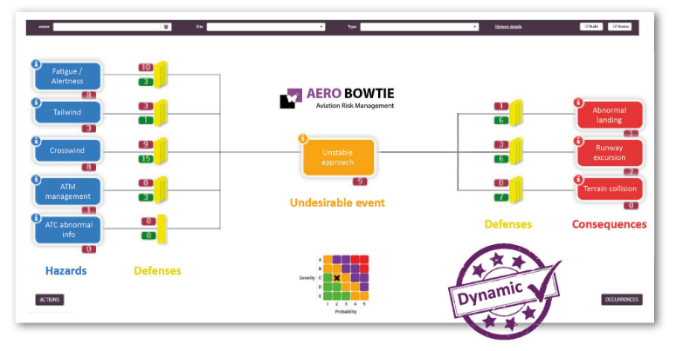
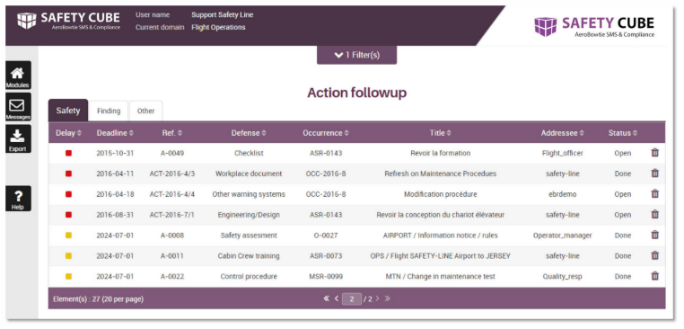
HBG becomes the first helicopter operator to adopt SafetyCube in Europe
Following in the footsteps of several French and international airlines, airports, MRO’s and ATM’s, HBG, which offers its expertise for passenger flights, maintenance, flight trainings and rescue services, becomes the first European helicopter operator to sign up to SafetyCube.
SAFETY LINE MADE IT TO HELLO TOMORROW GLOBAL CHALLENGE FINALS
SAFETY LINE MADE IT TO HELLO TOMORROW GLOBAL CHALLENGE FINALS
Hello Tomorrow is a global start-up competition which unlocks the potential of deep technologies to solve the world’s toughest challenges, by highlighting, empowering and connecting the most promising deeptech entrepreneurs across the globe with the right enablers.
From 4,500 applications Safety Line has been named one of the 6 Aeronautics track Finalists competing to win the Challenge. The startups will pitch on the stage in front of a jury of experts, industry, investors and journalists on 14th – 15th March 2019.

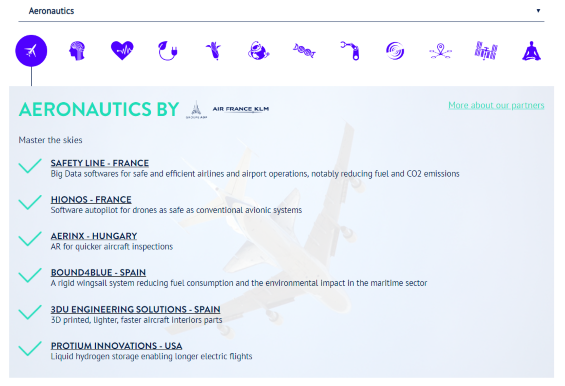
Learn more about Hello Tomorrow: https://hello-tomorrow.org/
SKY AIRLINE INNOVATES IN FUEL EFFICIENCY AS THE FIRST LATIN AMERICAN AIRLINE AND FIRST A320 FAMILY OPERATOR TO IMPLEMENT BIG DATA SOLUTION OPTI CLIMB
SKY AIRLINE INNOVATES IN FUEL EFFICIENCY AS THE FIRST LATIN AMERICAN AIRLINE AND FIRST A320 FAMILY OPERATOR TO IMPLEMENT BIG DATA SOLUTION OPTI CLIMB
Sky Airline, the second largest airline in Chile, has announced an agreement for innovative service provider Safety Line to deliver its fuel saving solution OptiClimb. Further to a three-month test campaign of over 3000 flights and satisfactory results, all Sky Airline pilots are now systematically implementing OptiClimb recommended speeds. The Big Data based solution combines historical flight data and accurate weather inputs to allow the carrier to save 5 to 6% of fuel during the climb phase, thereby reducing its yearly carbon footprint by 3400 metric tons.
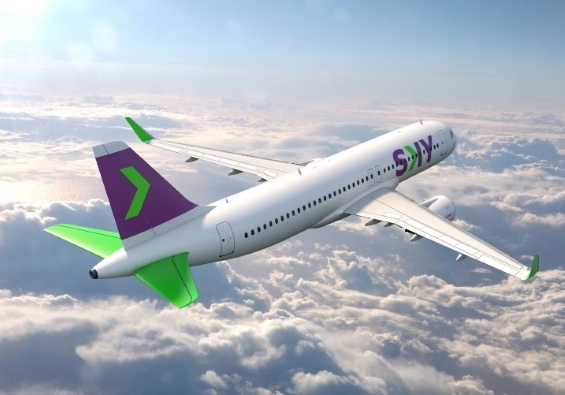
Reducing fuel consumption and CO2 emissions with optimized climb speeds
The climb phase can represent up to 30% of total fuel for medium haul operations. OptiClimb delivers optimized climb speeds to the flight crew ahead of each flight in order to reduce fuel costs and limit carbon emissions. The optimization process leverages historical flight data and combines machine learning performance models for each tail number together with accurate 4D weather gradients throughout the climb. OptiClimb is the only fuel saving solution specifically addressing the climb phase and is currently testing with 28 airlines worldwide.
Sky Airline becomes a pioneer in fuel efficiency
Following in the footsteps of Transavia France, Transavia Netherlands and Air Austral, respectively in Europe and in the Indian Ocean, the Chilean low-cost carrier becomes the first Latin-American airline to sign up to OptiClimb, as well as the first Airbus operator worldwide.
Safety Line’s founder and CEO, Pierre Jouniaux, stated: “We are proud to have Sky Airline as our first customer in the region. Their enthusiasm to test the solution with all pilots allowed to quickly achieve some measurable results”.
Sky Airline A320 Captain and Fuel Efficiency Manager Nicolas Chadwick stated: “The Safety Line support throughout the test campaign has been great, from integration with our EFB solution to addressing questions raised by the crew during normal operations. The savings achieved with OptiClimb will allow us to be more competitive in this aggressive market while preserving the environment”.
Read the press release here: https://bit.ly/2swkwgr
WEB MANUALS AND SAFETY LINE CONNECT THEIR SOFTWARE SOLUTIONS AND FORGE NEW SOLUTION PARTNERSHIP
WEB MANUALS AND SAFETY LINE CONNECT THEIR SOFTWARE SOLUTIONS AND FORGE NEW SOLUTION PARTNERSHIP
 Web Manuals is a Swedish company that sets the standard for digitizing manuals for the aviation industry by offering a streamlined solution enabling end-to-end control, compliance, agility, and cost-efficiency. The partnership with SafetyCube risk management software from Safety Line enables SafetyCube users to benefit from compliance update services provided by Web Manuals aviation experts.
Web Manuals is a Swedish company that sets the standard for digitizing manuals for the aviation industry by offering a streamlined solution enabling end-to-end control, compliance, agility, and cost-efficiency. The partnership with SafetyCube risk management software from Safety Line enables SafetyCube users to benefit from compliance update services provided by Web Manuals aviation experts.
New flag carrier Air Senegal first in Africa to sign for SITAONAIR’s high-speed IFC
New flag carrier Air Senegal first in Africa to sign for SITAONAIR’s high-speed IFC
Monday 11 February 2019 – Air Senegal has selected SITAONAIR to deploy its best-in-class high-speed inflight connectivity (IFC) on its new-generation A330neo fleet – making Air Senegal the first airline on the African continent to activate GX Aviation passenger connectivity onboard.
With a growing demand for connectivity from Africa’s young population and a change in the overarching aviation landscape, Air Senegal’s new inflight connectivity offering comes at a crucial moment for economic growth. SITA Air Transport IT Insights figures show that 90% of the world’s airlines plan to have major wireless inflight connectivity programs in place for enhanced passenger experience by 2021, indicating a prominent shift towards global connectivity as standard.
Senegal’s new flag carrier is ambitious to expand its footprint by connecting 2 million passengers on routes between Dakar and Paris, and drive innovation in the West African market. Air Senegal appointed SITAONAIR as the Inflight Connectivity service provider best-placed to support its goal by pioneering its connected passenger experience.
Under the deal, SITAONAIR is activating its market-leading Mobile ONAIR and Internet ONAIR inflight connectivity solutions – via Link ONAIR over Inmarsat’s GX Aviation network – across Air Senegal’s new A330neo. Following the launch of its first commercial flight in February 2019, passengers can now enjoy cutting-edge cabin connectivity across Air Senegal’s Business Class, Premium Economy and Economy offerings, on routes connecting West Africa with Europe.

With SITAONAIR’s Internet ONAIR solution over GX Aviation, Air Senegal passengers can access a personalized and seamless inflight connection, keeping them connected with their digital lives, business and loved ones as they fly. In another breakthrough deal for the African market, Mobile ONAIR will give passengers a seamless mobile connectivity experience, providing them with the opportunity to make calls and send texts from the air, just as they would on the ground.
David Lavorel, SITAONAIR CEO, says: “We are pleased to support and pioneer the inflight connectivity landscape, in what is a growing innovation area in Africa. SITAONAIR’s knowledge and expertise, both in establishing aircraft connectivity in burgeoning markets and in working alongside African telecommunications organizations and governments, makes us perfectly placed to enable all of Africa’s airlines to realize their connectivity ambitions. Our telecommunications experts have been at the heart of the significant work done with regulators and we look forward to advancing further for the benefit of the region.”
Philippe Bohn, CEO of Air Senegal says: “We at Air Senegal are extremely proud to say we are leading inflight innovation in Africa’s aviation industry, and delivering, thanks to our carefully-considered partnership with SITAONAIR. With our new A330neo fleet, we can connect passengers from Europe with the heart of our country within six hours. These passengers have high standards, needs and expectations when it comes to inflight connectivity and Air Senegal is ready to empower them, thanks to SITAONAIR’s support and solutions.”
To find out more about SITAONAIR’s full inflight connectivity portfolio and open platforms vision for delivering digital harmony to airlines, visit www.sitaonair.aero, speak to your local SITAONAIR contact, or submit an enquiry form.
CORENA Fleet Now Supporting Airbus A220 in Production
CORENA Fleet Now Supporting Airbus A220 in Production
February 11, 2019 – BOULDER, Colo.–(BUSINESS WIRE)– Flatirons Solutions® is proud to announce that the CORENA Fleet solution is now being used in production for Airbus A220 (also known as Bombardier C Series) aircraft operating in revenue-producing flight operations.
Airline customers use CORENA Fleet for the revision and viewing of maintenance information for diverse aircraft, engines, and components – including the Pratt & Whitney PW1500G engine used for the A220. The solution is used by tens of thousands of aircraft maintenance technicians, work planners, and authors to provide the technical information needed to keep thousands of Boeing, Airbus, Embraer, and Bombardier passenger aircraft flying.
Unlike competing technical information management solutions, CORENA Fleet is an Original Equipment Manufacturer (OEM)-independent software solution used by airlines to take control of their technical information. CORENA Fleet allows airlines to make Customer Originated Changes (COCs) to OEM maintenance content to reflect their proprietary best practices. The solution also reconciles airline changes against follow-on content revisions provided by the OEM that occur over the long service life of the aircraft.
“We are proud to support our customers in their adoption of the A220,” noted CORENA Fleet solution principal and former Chief Pilot John Badger. “By supporting the latest aircraft alongside mature fleets, we help customers to optimize their maintenance operations in ways that drive improved efficiency and lower costs.”
For details on the CORENA Fleet Solution, visit https://www.flatironssolutions.com/solutions/corena-fleet-operator/corena-maintenance-solution/
